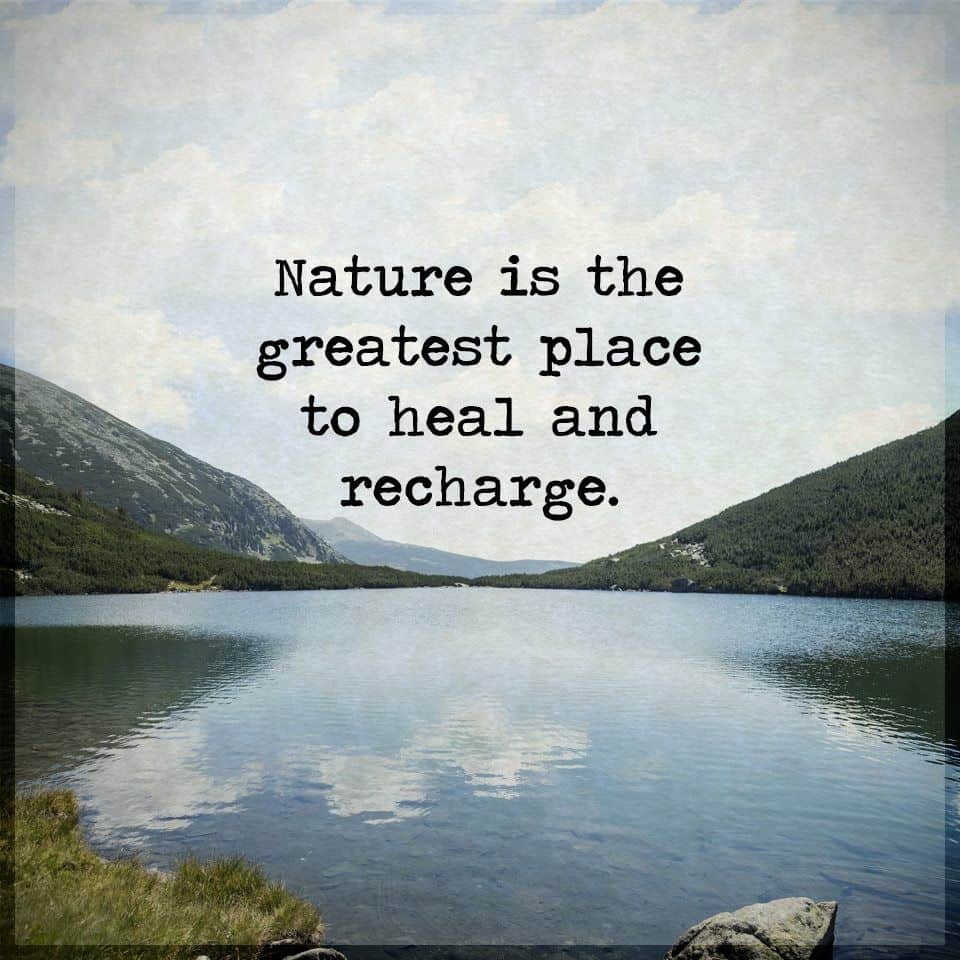Humans have thrived by connecting with the great outdoors since the beginning of our existence. In our modern world, however, many of us have been largely cut off from nature. Sure, we have parks and our backyards to connect with the Earth, but most people don’t spend near enough time outdoors. The huge increase in urban living within the last century may explain the rise in mental and physical illness.
Spending time outdoors provides humans with so many health benefits, not to mention, we need nature for survival. Studies have clearly documented that people who spend more time in nature have improved mental health and lower stress. In fact, a new study from researchers around the world revealed that more time spent in nature strongly correlated with reduced depression symptoms. This shouldn’t come as a surprise, though, as we evolved to live close to nature.
The study focused specifically on how nature affected people’s mental health during the pandemic. Of course, researchers found that people who ventured outdoors instead of staying inside during lockdowns had higher happiness levels. By immersing ourselves in nature, we can take a break from our screens and all our responsibilities for a while. It gives us a chance to recharge and allows our minds to focus on being instead of doing.
Prior studies have shown that being outdoors in green spaces improves mental health by lowering stress and depressive symptoms. Nature also promotes a positive body image since people feel more connected to themselves and their environment. For this study, researchers wanted to analyze how the lockdown affected people’s mental state. Specifically, they took account of participants’ daily screen time, feelings of loneliness, and time spent outdoors.
Study showing how time spent outdoors reduces depression symptoms
 Researchers from Anglia Ruskin University (ARU) in the UK, the Karl Landsteiner University of Health Sciences in Austria, and Perdana University in Malaysia took part in the study. Researchers measured the happiness levels of 286 adults three times per day at random intervals over the course of 21 days. They used an experience sampling method to ask participants about their thoughts and feelings during their daily lives. This self-reported data allows individuals to provide information in real-time rather than relying on memory, which helps prevent recall biases.
Researchers from Anglia Ruskin University (ARU) in the UK, the Karl Landsteiner University of Health Sciences in Austria, and Perdana University in Malaysia took part in the study. Researchers measured the happiness levels of 286 adults three times per day at random intervals over the course of 21 days. They used an experience sampling method to ask participants about their thoughts and feelings during their daily lives. This self-reported data allows individuals to provide information in real-time rather than relying on memory, which helps prevent recall biases.
Published in the Journal of Happiness Studies, the academics performed the study in April 2020. Austrian participants could only leave their homes for certain activities, including exercise. The study revealed that participants who spent more time outdoors than indoors had higher happiness levels.
Furthermore, they discovered that people who logged more daily screen time had more feelings of loneliness and less happiness. Interestingly, though, those people who reported feeling lonely showed improvements by spending time outdoors. Lockdowns impacted people differently depending on their living situation and other factors. While the isolation made loneliness more intense, the study showed that nature eased this feeling, even if people went outdoors alone.
Co-lead author Viren Swami, Professor of Social Psychology at Anglia Ruskin University (ARU), said, ”While lockdowns can help slow down the transmission of COVID-19, research has also shown that prolonged periods of lockdown take their toll on mental health.”
“Our results are important in this context because they show that being able to spend time outdoors under conditions of lockdown has a beneficial impact on psychological wellbeing. Being outdoors provides opportunities to escape from the stresses of being confined at home, maintain social relationships with others, and engage in physical activity — all of which can improve mental health.”
“Our findings have practical health policy implications. Given that further lockdown restrictions have now become necessary in the UK, public health messages that promote getting some fresh air instead of staying indoors and staring at our screens could really help to lift people’s mood this winter.”
Seasonal depression already impacts millions of people worldwide, especially in colder regions of the world. Spending time outdoors, especially with others, can help mitigate these feelings and boost mental health. Previous studies have shown how spending hours staring at our screens leads to mental and physical health problems.
Just some of the negative outcomes of staring at screens all day include:
- Eye strain, blurred vision, and long-term vision problems
- Increased risk of obesity and overweight
- Disrupted circadian rhythm, especially when using screens at night.
- Increased occurrence of headaches
- Neck and back pain
- Lack of socialization or impaired social skills
- Higher rates of anxiety, depression, and other mental illnesses
- Decreased attention span
- Scattered thinking and reduced cognitive abilities
- Moodiness and irritability
- Decreases productivity
- Causes obsessive behaviors, especially when using social media
Humans didn’t evolve to stare at bright screens all day, especially at night when our brains need darkness to prepare for sleep. Scientists and researchers around the world have started spreading awareness about our need to get back to nature. While social media and other technologies have provided many benefits, we need to regulate our use. By putting limits on our technology consumption, we have more free time to spend outdoors or recharging in general.
Other benefits of spending time outdoors include:
- Lower probabilities of cardiovascular disease
- Increased longevity
- Reduced risk of developing obesity and diabetes
- Better well-being and less mental distress
- Enhanced short-term memory
- Increased self-esteem
- Eases ADHD symptoms
“I go to nature to be soothed and healed, and to have my senses put in order.” —John Burroughs
 Final thoughts: Spend plenty of time outdoors to help ease depression and other mental illnesses
Final thoughts: Spend plenty of time outdoors to help ease depression and other mental illnesses
Humans evolved to live close to nature, but our modern way of living severs our ties to Earth. However, we can still connect with the great outdoors, even in urban areas. Simply walking through a local park when you have the day off can do wonders for your mental health. We all require nature for survival, and studies have shown that people who get more outdoor time have fewer depression symptoms. Try to walk in nature a few times per week, and reduce the time you spend on your phone or watching TV. You’ll start feeling better before you know it!


















